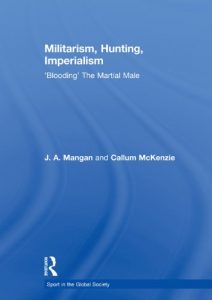The late Victorian and Edwardian officer class viewed hunting and big game hunting in particular, as a sound preparation for imperial warfare. For the imperial officer in the making, the ‘blooding’ hunting ritual was a visible ‘hallmark’ of stirling martial masculinity. Sir Henry Newbolt, the period poet of subaltern self-sacrifice, typically considered hunting as essential for the creation of a ‘masculine sporting spirit’ necessary for the consolidation and extension of the empire. Hunting was seen as a manifestation of Darwinian masculinity that maintained a pre-ordained hierarchical order of superordinate and subordinate breeds.
Militarism, Hunting, Imperialism examines these ideas under the following five sections:
- martial imperialism: the self-sacrificial subaltern
- ‘blooding’ the middle class martial male
- the imperial officer, hunting and war
- martial masculinity proclaimed and consolidated
- martial masculinity adapted and adjusted.
This book was published as a special issue of the International Journal of the History of Sport.






